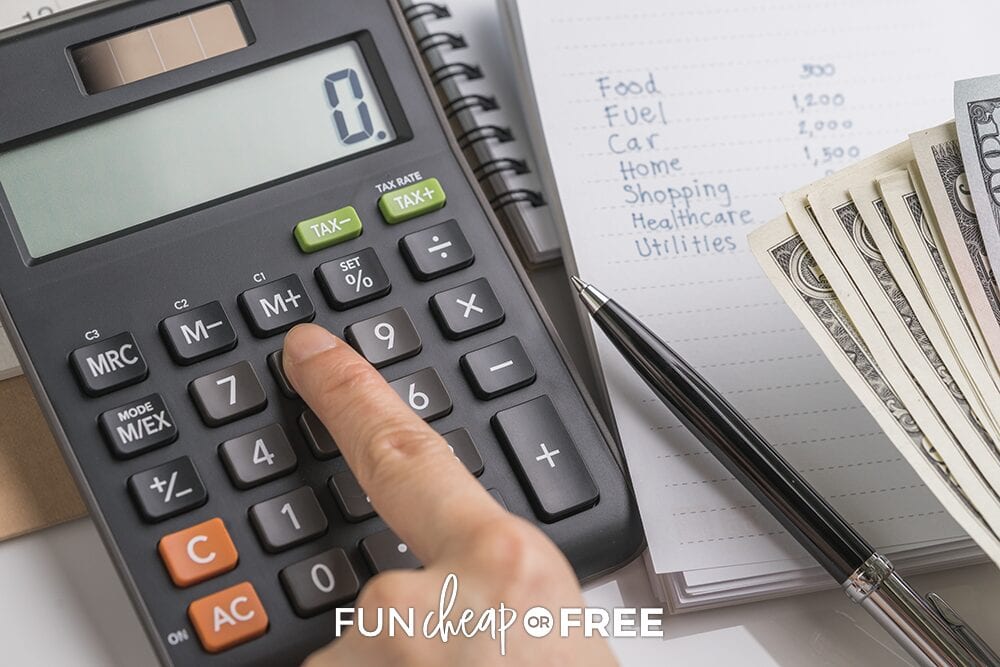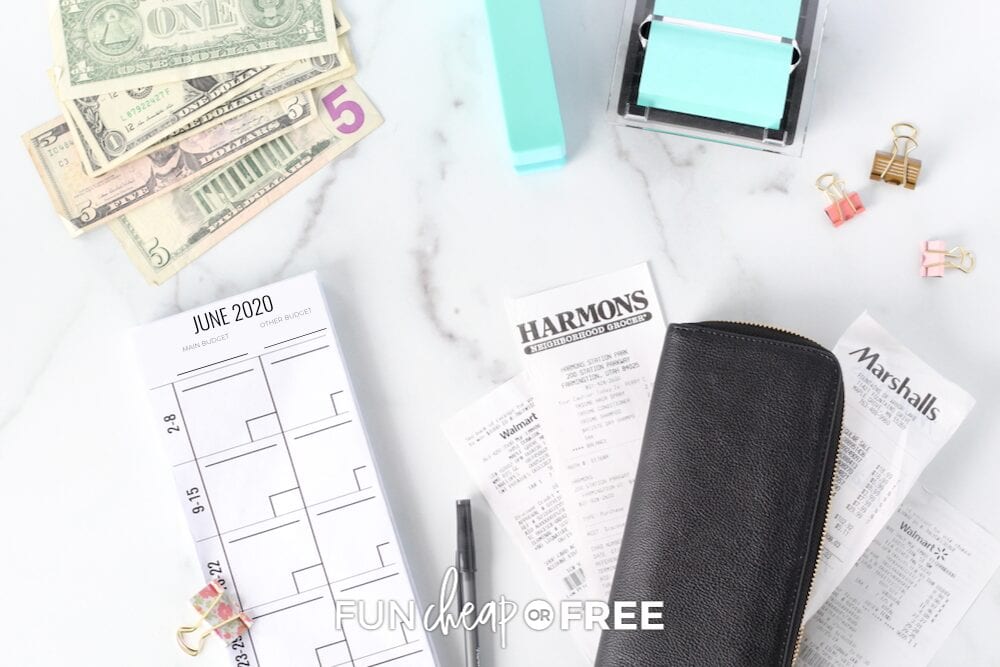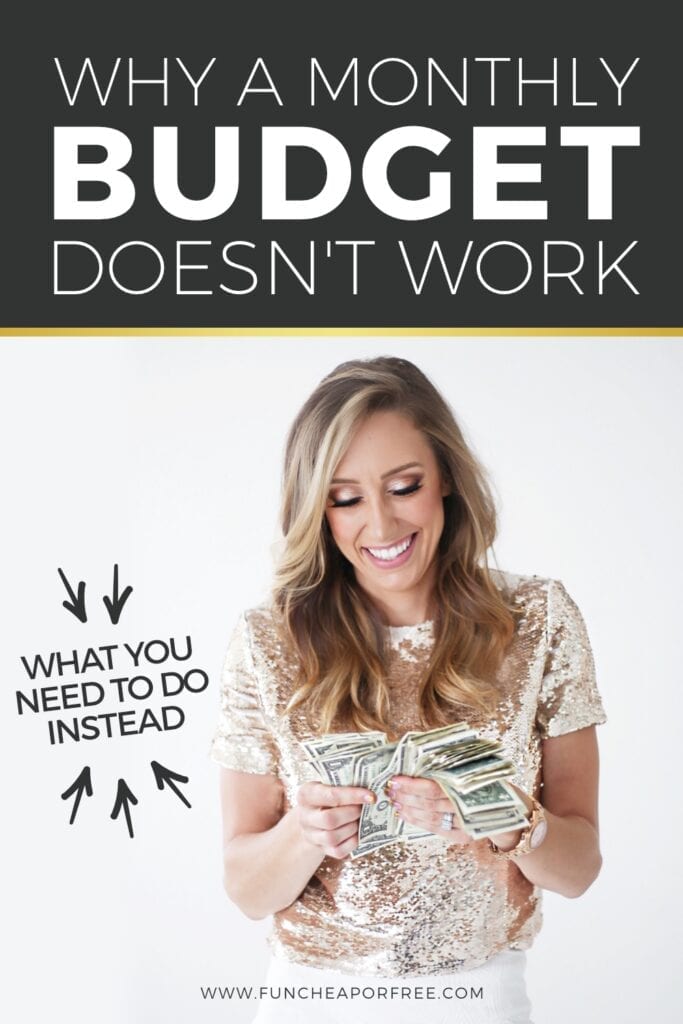A month is such a long time to track anything. Switch to a weekly budget and never worry about a monthly one again! Sit back and be amazed at how easy it is to keep up with. You’ll be patting yourself on the back in no time as you get more things done, son!
Budget. The dreaded B-WORD. Can you feel the cold sweat brewing?
When Bubba and I went through our F.D. (financial disaster) we were forced to start from scratch. He took over the role of managing our money and staying on top of the bills, I took over the role of finding everyday systems that WORK (see my “dividing financial responsibilities” post for how we did this).
As we trudged through our F.D., there was a lot of trial and error, mostly on my end since I am the majority spender in our family between the groceries, house needs, kid needs, and well…general shopping needs (hey, this woman has fashion needs, ok??). Through the trial and error, one thing became abundantly clear…
IT'S TIME TO SWITCH TO A WEEKLY BUDGET
Why? Because monthly budgets don't work very well.
Screetch. Crash. Record scratches. Dramatic silence.
I know, I know, I know, but it's what you've always done. And your mom. And her mom. Plus your uncle's half-sister's hair dresser's step cousin's mom. While that may be so, I want you to think about how you are currently budgeting and ask yourself this question…
Is the way I'm budgeting currently actually working?
If the answer was yes, then good for you for opening this post in the first place–leave a comment and teach us your ways!! 😉 For the rest of us, the truth is the definition of insanity is doing the same thing and expecting different results. Might be time to switch things up a bit.
Now, let me clarify one thing. In this post I'm referring to a “budget” as a category you actively spend money on regularly. Not utilities, mortgage, health insurance budget, vacation budget, and not even necessarily gas (since I think of gasoline more like a utility). Because those usually do operate on a monthly basis, and you don't have much control over those expenses for the most part.

When I say “budget” I'm referring to regular spending that is in your control, such as: shopping budget, grocery budget, home decor budget, date night budget, etc.
Traditionally these budgets are set on a monthly basis. Today we're going to flip that on it's head!
WHY YOU SHOULD USE A WEEKLY BUDGET INSTEAD OF MONTHLY
So, let's break it down so that you can fully understand why a weekly budget is so. much. better. than a monthly one!
YOUR LIFE RUNS BY WEEKS, NOT MONTHS
When you sit down and look at your upcoming calendar, I doubt you're organizing your life (in detail) an entire month at a time. Sure, you may glance ahead for a general overview. But most likely you operate on a weekly basis…so why shouldn't your budget? Trust me guys, a monthly budget is so yesterday.
Oh yes, I did just quote a Hilary Duff song…
THE SMALLER THE NUMBER, THE MORE MANAGEABLE IT IS
Let's take a grocery budget, for example. I recommend aiming for $100 per person in your family per month (as explained here). For my family, that is $800/month.
If you give me $800 cash on the first of the month and tell me to make it last all month, what am I going to do?
Well first, I'm going to get $800 in $1's and make it rain while dancing in the money while jumping on my bed like they do in the movies. Obviously.
Then I'll do my shopping as usual, not being all too cautious because $800 smacks is a lot of dough. I'll burn through all $800 in a week and a half (gasp! I have no idea how that happened, Bubba! seriously!) and tell myself I'm not going to spend money for the rest of the month...yeah right.
30 or 31 days is a LONG TIME, folks! Don't do that to yourself! Single digits is the goal. Our brains and will-power handle small numbers MUCH better than large ones.
HOW TO FIGURE OUT YOUR WEEKLY BUDGET
My $800 monthly grocery budget suddenly turns into $200/week. It's not only easier to track and wrap my head around, but it paces my spending for the month which helps me avoid going over…by like, 10 million times. Clinically proven.
Ultimately, you only need to focus on that budget for 7 days (or 6, if you don't spend money on Sundays like I do). THAT'S IT. Anyone can handle staying strong for 6 days.
See, doesn't that seem so cute, cuddly, and doable?
KEEP YOUR WEEKLY BUDGETS TO 3 OR LESS
There are lots of envelope budget systems floating around, where you have an envelope of cash for every little thing in your life: Haircut envelope. School fees envelope. Eating out envelope. Dog food envelope. Groceries. Gas. Snail Bait. Diet Coke runs.
Well…what happens if you don't need snail bait that month? Or what if you need more groceries than usual because you have family in town? It gets confusing with a capital C, guys!
I recommend 3 budgets or less. I, personally, only have two: 1) Grocery and 2) Other.
“Grocery” is anything consumable. I'm talking food, toilet paper, dog food, toiletries, diapers, formula…snail bait.
“Other” includes everything else I spend money on during the week, such as outings with the kids, gas station drinks, shoes and clothes, a throw pillow for the couch, soccer cleats, baby shower gift, fast food runs, etc. The amount depends on your finances and expenses. When we first started, we started with just $50/month because that’s all we could afford. For the sake of example, let’s say our “other” budget is $400/month.
PSA: See all about what else these budgets entail in my “Simplest Budgeting Technique Ever” post.
ALLOW FOR BREATHING ROOM
By only having 2 or 3 budgets, it allows for flexibility. For example…
I have $200/week for “groceries,” $100 for “other.” Let's say I have NO food in the house and spend $250 on groceries that week. That's fine! I still have $50 for “other.”
The next week I don't need as many groceries since I did a huge haul, just $40 for random consumables. That means I now have $260 for “other.” This allows plenty of money for whatever I need that week and had to give up last week (aka just 6 little days ago).
FIND A GOOD TRACKING SYSTEM
If you're old-school and like writing things down like me, I recommend my good ol' envelope tracking method, or even a check register (if you youngsters out there even know what that is…).

If that's not your cup of tea, keep track in your phone! Use a financial app like Mint.com, which is what Bubba uses to manage and track all of our bank accounts, bills, savings accounts, HSA, etc. You can also use a good ol' spreadsheet in the Google Sheets app, or whatever works for you.
Heck, I can't remember the last time I even went to the bathroom without my phone, let alone left the house without it. Find a method that works for you, and track EVERY dime. Give it a good month before trying something new; new habits don't form overnight, you know.

So there you go! Next time you sit down to look over your finances, break the monthly sum down into a weekly budget and it'll make your life a whole lot easier.
CHECK OUT BUDGET BOOT CAMP
If you need more help getting your budget and finances in control, then make sure that you see what Budget Boot Camp is all about!
It's a super fun, online video program that makes budgeting easy to understand! I'm so confident that you'll love it that I have a 100% money-back guarantee. Plus, you can use the code FCFBLOG at checkout to get 10% off just because!
Looking for more great ideas?
- Tired of living paycheck to paycheck? Come learn how to start a budget and break that chain!
- Do you really have the itch to buy something? Ask yourself these 10 questions to see if the purchase is worth it.
- Save big money on your electric bill with these tips!
Now if you don't mind, I need to go find me some snail bait…




Thanks to your posts I’ve been doing the weekly envelope system for almost a month now. It DOES feel so much more manageable looking a week at a time versus the entire month.
I’m finding myself getting back to my inner frugalista, making do with what we have and throwing things together for dinner that I otherwise wouldn’t have (and still taste BOMB, bt-dubs).
I’m gonna stick it out with this system, and continue to tweak the rest of our budget, because what you said makes TOTAL sense. I don’t get my haircut each month, or buy something new for the home every month, but that “extra” budget category would make a whole lotta sense for us! Thanks, Jordan. XO
Hi Jordan. Thank you so much for sharing your insights. Youre absolutely right on the money. I JUST started doing this for my June 2015 budget. I feed just me and have slimmed my food budget down to $12/week. It is really forcing me to really THINK about my purchases. My sloppy choices in the past have prevented me from reaching goals that, until I came across your blog, seemed intangible. I was feeling as though I was trapped in a fixed financial situation.
Have you checked out personal financing website mint.com? My husband and I have been using it for years and it’s transformed our budgeting and spending habits! We are able to quickly see (there’s even a fancy app – yay!) and categorize purchases from any credit card or debit card (and input cash purchases by hand), and see “trends” in our spending – as an engineer and lover of data and graphs and plots, this is my favorite part! We can pull up by month, by day, by year, last 6 months, etc etc for each category (all the way down to snail bait – you can create your own categories and budgets) and see our spending. You can even split transactions – so when I go to Target and buy $75 of groceries and $10 of home supplies (snail bait) I can split that out so it’s properly allocated to my different budgets and categories! Seems like you already have a system that is working for you, but you should check it out and see if it would be something your readers (like me) might benefit from – those who like apps and graphs and all that good nerdy stuff 🙂 Thanks for your post!
Yes! We use it every day for overall money management! I just prefer different methods for my weekly budgets. I forgot to include that, I’ll add it now. Thanks!
Hi! First I’m so glad to see your site back up and running! I just wanted to share what we do as a family. We do our big monthly budget using Dave Ramsey’s new budgeting software (free) called Everydollar. I like it because it forces me to assign every dollar and in my case every penny a name, which eliminates the conversations near the end of the month, well were did the money go?? We are a bit old school in that we do use envelopes. I am one of those people who have alot of categories (Haircuts, Oil Change, Inspection, Birthday, Xmas, car repairs and a few more). We have envelopes for things that we know come up throughout the year, that I know about how much it costs, but aren’t necessarily a monthly expense. I know our inspection is about $75 for each car, so I took $75 and divided it by 24 pays/year and every pay I just put that amount into the envelope, so when it comes time to pay that bill, I just use the money in the envelope and I don’t have to worry about taking $75 out of the budget to pay for it. Last year my car needed some repair work, very minor thankfully. I had been using the envelopes for a few months and I had about $200 saved up for car repairs, the total bill was $250. I obviously didn’t have $250 in the envelope, BUT it was great to only have to come up with $50 instead of $250. Sure every system has it’s flaws, but it works for me.
Grace and Peace
Leslie
I use an app called Accounts2 . I have it on my iPad and iPhone and I can sync them. You can do whatever you want with it. I have all of my accounts in there and use it as my check register. But, you could easily add a line item for the various weekly budgets you assign yourself. It enables you to take pictures of your receipts. I just entire my transactions in right at the register. Once you have been using it a while, all you have to do is enter a few letters and it will automatically pull up the company that you need to log a receipt for. I LOVE it. And, balancing your check book (yes, I balance my check book every month!) is soooo easy and FAST! You do not have to worry about adding or subtracting errors. If you need to cancel a transaction or change an amount, you can do it and the balance automatically adjusts. One other great thing about it is that you can assign each of your transactions to a particular category and pull nice weekly or monthly reports of where your money is going. And, you can also set certain entries like your car payment, mortgage, etc… as recurring. It’s free, so give it a try.
I Kind of think different things work for different people and the point is to find some kind of system that works for you and then use it. For us, we do a monthly grocery shop. We find if you step into the store more often, you spend more. Everytime you are in there is an opportunity for an impulse purchase etc. So the more times we go the more that is spent. That’s why we only go once a month. We have a family of 5 and we spend 250 a month on groceries. {which includes Tp Laundry soap. Shampoo etc}. A lot of times we push it into 5 weeks ish also. For us this works.
This is great info Jordan. Budgets have been a struggle for our family. Me and my husband have tried different ways to keep track of our money since we’ve been married (13 years!) Ah! We tried your ‘7 account’ system and that worked great – but in doing that, we also discovered a tool that helps us even if we let it “slide” a few months. and that is to get one of those yearly calendars that looks like a small book with a month on each page. We literally “map” out when each of our bills are due every month and when are paychecks are. (our biggest problem is that income is sporadic for us.- he gets paid every two weeks, i get paid bi-monthly.) so even the weekly budget can be a challenge if the calendar falls a certain way (like it does for us next week – no income for next week at all!) but this little “roadmap” has really helped. we can add in birthdays, holidays and how much we plan to spend for those and then work backwards – it gives us a much more accurate idea of where our money needs to go between now and the next paycheck. We still use the 7 accounts and we use them more for our “free spending or fun money” and savings for each of us. Its definitely made our marriage a lot happier !
Hello there!
I just love all of the different types of helpful information you provide! So thank you first of all. I did have one question about this budgeting post to clarify. With the grocery budget, does that also include gas for your vehicles in that category? Or is that in a totally different category all together?
Thanks so much for the help!
Sincerely,
Lauren
Whoops! I just realized that in a different section that I must have skimmed over a bit quicker than I should have I saw that you did include gas for your vehicles in the “grocery” category. Thanks for the patience with my Preggo brain! lol
Sincerely,
Lauren
Thank you so much for posting this today! I FINALLY (after following your blog for a few years and attending FCF Boot Camp twice) have completely grasped the concept of this way of budgeting. I have been making things difficult for myself by having too many categories, but I sat down for a few hours and really pounded out the numbers. The result? I now know exactly how much we need to be making monthly/yearly, net AND gross, the exact total of our fixed expenses, when each auto payment comes out of our account and how much I can spend on groceries and ‘other’ each week! And I’m kickin’ myself for not figuring it out sooner, but live and learn! I’m just glad I know where we stand so we can make and achieve goals more effectively. And when our income increases the 70-20-10 rule will help us to divide the money and make sure we are adjusting our savings goals and spending correctly. Thanks so much for sharing your amazing wealth of experience and knowledge with the world, And in regards to your previous post about sharing your abundant lifestyle you’ve created for yourselves by working your butts off at the ranch – I applaud you and love seeing you on the other side and am eager to get there myself and now I have (understand) the tools. Just keep being you. I love that you are genuine and share your ups and downs and everything in between (especially Bach recaps!). XOXO
Hey Jordan! I love this weekly budget method and have been using it for about 6 months now and when I forget it totally throws me off! It’s like I need it! I use your envelope method too and that has helped sooo much! When my “other” weekly needs to focus of my budget that week I have gotten very creative (cough cough pinterest defendant) with how to cook a yummy and healthy dinner for our familyadventures 4. Now because I know you love your rice cooker as much as I do, did you know you can cook a complete meal in the rice cooker?! I know, crazy right so fast, easy and cheap! Anywho, check it out on Pintrest. It’s totally saved us from getting take out every night this week during our move!
So glad you brought this up! Luckily we are doing this already, I transfer x amount over every two weeks, per paycheck. Would you put kid’s activity expenses in “other?” I have five kids with activities for three of them, my older ones. It add up! And it’s different every month. ugh How bout fuel? Is this considered a regular bill? Where would you put kids clothing (we use our personal money for our clothing), dining, entertainment, and date night babysitters? We no longer have flex spending (bummer) so we pay for co pays which is unpredictable. For bills like this and auto expenses we have another account we transfer x amount to cover these unpredictable things. Sorry I’m a detail person and would love your input. 🙂
I love this system. It makes this, busy full-time working Aussie, Mum’s life simpler, I don’t have the time or energy to work out if I have enough money in say, the haircut budget to get everyone’s hair cut that week. Also, it also means I can feed my family but still buy things guilt free for myself and not put myself last, which almost all Mum’s do.
Thank for your time and efforts Jordan.
Hope you found your snail bait 🙂
Your post title intrigued me, and I clicked on it to see what you meant. Because we use a budget successfully and I can’t imagine NOT using one. So it was good to see that you meant use a weekly budget, rather than a monthly budget. . . but one way or the other, you are still budgeting. We use YNAB (you need a budget.com) and love it. I break my monthly budget down in weeks in YNAB, just like you suggest, and it really helps me stay on track. In YNAB you assign every dollar in your paycheck a job (kind of like Dave Ramsey’s method, but no envelopes!) and then you track each purchase in the YNAB software. We had tried mint.com before, but didn’t like it because all it did was track what we DID spend, rather than help us keep track of how much we SHOULD spend (and while that may be a small difference, it made a HUGE financial difference for us!) Anyway, for people that like to keep track of every penny by assigning each dollar a job, I highly recommend YNAB as a fabulous budgeting software. It’s not free, but pretty darn cheap:)
Have you ever thought of creating an app that tracks your envelopes? I don’t carry a purse a lot of the time and it would be awesome to track on my phone 🙂
I love doing the weekly budget, it has worked great for us! We have a couple more envelopes, like for cars, and house repairs but it works for us. You always have great ways to save and budget!
I agree with Meg. YNAB is the best!
Jordan I absolutely agree! A weekly budget really helps me keep perspective on what I can spend to get us through that week, and it helps me to actually see the cash instead of using my debit card.
But a problem I run into is that I have to buy diapers, wipes, household cleaners and all my other “big household purchases” at Costco. This definitely helps me save money on each individual item when I buy them in bulk, but if I have to buy diapers and wipes and formula in the same week, it depletes my entire budget for the week.
So I start with my monthly budget, and then set aside the money I spend on household bulk items for the month, and then divide what is left into my weekly budget for day to day groceries and the rest of our expenses. Do you have any suggestions? Is there is a better way to divide it up and still get my bulk items from Costco?
Loved this post, and you’re hilarious. It makes for such a fun read!
We do something similar, but I really like the app and Website called Goodbudget. It’s really simple and allows me to set up virtual envelopes for groceries, gas, and other. We are a family of 6, and even though I try to be thrifty and only buy things we need, I don’t know how we could get down to 150/week for groceries and 75/week for other. Maybe because my kids are older and they eat more and have more activities? I know you have covered the grocery shopping a lot, but maybe seeing what all you buy in a typical week would help. I would love to save more money, but I just don’t know what else to cut out.
An AWESOME idea would be for you to develop a FCF app!! How cool would that be??? To have our own weekly envelop tracking app!! Oh, I’ve also found 2 weeks instead of 1 week to be effective, since my walmart and costco runs usually last 2 weeks, and you’re going to the store less often.
Love the feedback and ideas! Thanks for sharing!
Hi Jordan! I am wanting to change my monthly budget to your suggested weekly budget using the envelope (so smart!). I see the post that has the 2013 (or maybe the 2014) download with the months broken down into weeks with the dates. I am wondering if you have a post for 2015 broken down into the weeks? Does that make any sense?
Thanks so much,
Christin
Hi Jordan! I stumble upon your blog when I saw my friend pinned your post on making freezer meals. I was inspired and totally going to try your budgeting system for this coming month. We’ll see how it goes 🙂 I’m certainly looking forward to more of your amazing ideas. Thank you for being such an inspiration. You are truly amazing!!
Yay! Let me know how it goes, thanks for stopping by!! XO
Jordan, I love your blog and was re-reading some of your post because I am about to dive into a budget for the first time in my life (Im 24, single, and decided I need to see where my money is going!) I so wish I could send you all the numbers- bills, income, how much extra expenses are, what to save, etc and you just make me a budget.(That would be a DREAM!) Its overwhelming to look at these numbers and want to do it right so badly but I feel like I don’t know how or where to start! Thanks for these post and Im going to try my hardest to make a budget and stick to it!
Hannah, what a sweet comment! Thanks for reading and commenting. Did you know…I actually DO make budgets for people! I do one-on-one consulting where I take your numbers and information and do whatever you need me to do with it. If interested email me, [email protected]!
Here in Australia, weekly (or fortnightly) budgeting is so much more popular and it’s nice to see it on a saving money blog! We don’t really budget monthly in Australia at all – many expenses are not charged monthly here is why 🙂
We used to budget fortnightly as that was our pay cycle but that moved to weekly and it is much easier to keep a track of things!
Thanks again for a great post!
Well hello to Australia! Man, I love my Aussie readers. I really should do a meet-up over there, huh?? (Any excuse to get there! :))
Hi there, Jordan! I stumbled across your website and am eating up your tips and think you and your family are absolutely adorable. Being one of your Canadian neighbours, and only 5 minutes from the border, I can really appreciate a lot of your insights! That said, I have to park on the food budget for a moment… I have 3 children, clearly much older than yours, and they are all involved in high-level rep sports; from hockey to softball to running long distance. My husband and I also run 1/2 marathons. How would you suggest tackling the ever-dreaded food budget if you were in my shoes??!! My eldest is already 5’5″ and borrows my clothes… she can eat anyone out of house and home and seems to always be starving in her skinny frame!! All three of my kids can out eat us any day! MY other glitch is the fact that I have Celiac, so our entire home is gluten free! We would be more like triple… approaching quadruple… your budget!! And that’s with menu planning, eating whole grains, super healthy, everything from scratch, close to nil in the processed food department! I’m sure I’m not alone!!! Tips please!!!!!!!!
Reading this definitely gave me some insights on the whole monthly budget thing! Thank you!
Such great advice to break down your budget into weeks. Haha I’m like you and make it rain at the beginning of the month because I think we have so much.
I hope your blog is still active. This is a great post and you deserve every dime of residual income you get from this. I have been using YNAB which budgets on a monthl ybasis. My wife an I are now working on paycheck to paycheck intervals, about two weeks.